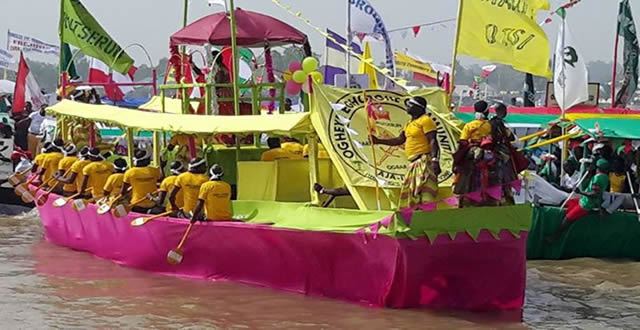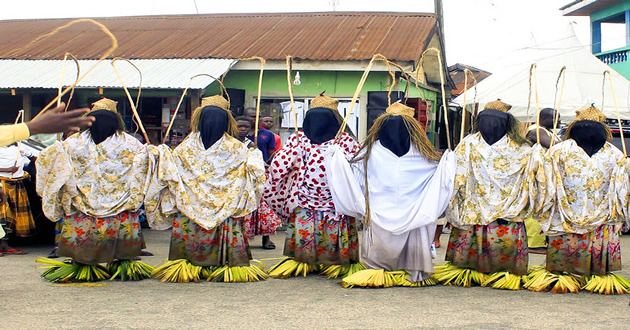
Itsekiri Kingdom
Now, we may first try to describe the Itsekiri peopl e whose kingdom is Warri. As already pointed out, the Dutch map of 1705 referred to above, marks their homeland as Awyri which over time had variously been spelt Iwere, Ouere, Oere, Warree, Wari. and now Warri. The Edo and the Yoruba call them Iwere. The people who constitute the Itsekiri tribe have diverse origins: early settlers from Ijebu, some from Igala and Aboh came to settle in various communities such as Omadino, Ureju, Ugborodo , Inroin, etc at various times out of human memory . Then a party from the Benin Royal family about the end of the 15th century set up a monarchy which constituted these erstwhile autonomous mini-communities into a nationality which it is today.
Prof. P. C Lloyd says that “in the English literature they are known as Warri or Jekri, though in the 19th century they were often referred to as Benin since contacts with them were first made on the banks of the Benin River”. Here was a Kingdom founded by the royal party from Benin, but by the early sixteenth century through th e seventeenth, it had done so much overseas trade to match or exceed that of the mother – kingdom; the reason being its advantageous position within the empire on the rim of the Atlantic. The Itsekiri speak a Yoruba dialect whose vocabulary has been widened by the infusion of a large number of Portuguese, Bini and English words.
As an introduction of the influence of the Bini culture in Itsekiri land, it is pertinent to recall part of the address presented to Prince Solomon I.A Akenzua, then Edaiken of Uselu (now His majesty the Oba of Benin by the Itsekiri community in Benin) by the Itsekiri community in Benin on the occasion of his retirement from public service and return home in 1973.

We would like to recall the special historical relationships that bind your people and ours. Both Bini and Itsekiri histories agree that Ginuwa, a prince, as your goodself, left this great city to found the Iwerre (Warri) Kingdom about 1480. In the 15th and 16th centuries, these two kingdoms emerged as a civi l izing force in this part of the world and provided great splendour which attracted European adventurers, missionaries and merchants alike. The visit of D’ Aviero of Portugal of Benin City in 1485 and the establishment of a Catholic Mission in Benin about 1515 AD were great historical developments that have had their parallels only in Iwerreland. At the beginning of the 17th century, a son of a reigning Olu went to Portugal for ten years (as the Oba’s ambassador went to Portugal between 1481 and 1495 to be educated in the best schools and returned with a Portuguese lady of a high birth as his wife, their son , Antonio Domingo was Olu of Warri in the 1640s. The site of the Catholic Cathedral (St. Anthony) built in Ode-Itsekiri is still called (Satoni)… we have proud similar chieftaincy titles-Iyatsere as Iyase; Ologbotsere as Ologhosere; Uwangue as Uwanguel Otsodi as oshodin and many other… Even your present esteemed title of Edaiken compares with “Daniken”, the last ceremonial stage of the Olu-Elect before coronation. And, our Itselu means “sacred quarters” of the Olu’s mother as Uselu in Benin. Aslo, our war songs, lyrics and burial songs have common roots with Bini ceremonial songs. Truly, these cultural bonds span the vast areas of royalty, chieftnancy, language, music and dancing, rituals to dynastic ties.
The Warri throne, being a direct off-shoot of the Benin monarchy, bears all its attributes. Historically, the Olu of Warri, like the Oba, is the personal focus of the people’s loyalty and affection. The crown, highly glamorised, is the symbol of supreme authority in both kingdoms. The Olu, like the Oba (aiguobasinwin) does no wrong and can not be queried or challenged (Afo massin; Afo were tse were); he is the keeper of the corporate conscience of his people. The Oba is titled Uku-Akpolokpolo, which literally means high and extremely very large. In essence, it means next to God, divine and infinite. He is also addressed: Ogie N’Ogbomwan be edge uwuikomwam; i.e king who can confer life a n d death. A similar title of the Olu of Warri is Ogie-uwu i.e , king over death. The Oba is also addressed: Ekpen N’uwa i.e the tiger at home. In spite of the contemporary societal forces which have constrained the practical meanings of these titles, in the nitty-gritty of the norms of Benin and Warri societies, these mind-bending titles, theoretical as they are, still do provide the pillars and sign-posts that guide most traditional activities. These titles remain stilted and honorific.
Examining some royal titles in Benin and Warri, one would be amazed at the striking oneness of their roots. Even in some cases, Warri tended religiously to follow Benin titles every sixty years on the average. The fourth Olu of Warri, Ojoluwa who ascended the throne in 1550 assumed the title of the fifteenth Oba of Benin Ozolua who reigned in 1483; the fifth Olu Esigie who became king in 1570 bore the title Esigie, the sixteenth Oba of Benin who came to the throne in 1504. And the thirteenth Olu Akengboye (1710) took t he title of the twenty-second Oba Akengboi (1669). Others who followed were the fortheeenth Olu Atogbwua (1735) who bore the title Orhogbua, the seventeenth Oba (1550). And the sixteenth Olu Akengbuwa (1807) took the title of the thirtieth Oba Akengbuda (1750). Even Erejuwa in Warri and erediauwa in Benin sound alike. In both cultures, part from the crown, and other high-profile symbols of royalty are swords and scarlet cloth. The Itsekiri have derived the names of these items from Bini.
Chieftaincy
The main Itsekiri chieftaincy titles are derivatives of Bini titles. Some are Iyatsere (Iyase), Ologbotsere (Ologbosere), Uwangue (Uwangue), Olisan (Oliha), Otsodi (Oshodin), Osula (Osula), Ojomo (Ezomo) and Ero (Ero). In both kingdoms, chiefs perform palace rituals and, in the olden days, assisted their monarchs to rule in-council.
According to Igbafe the custom was for the Oba’s eldest son, on reaching maturity to b e shown round to the people and installed as the Edaiken, or heir to the throne. He was then sent to live in Uselu, a village which was outside the walls of the town but is now incorporated in Benin City , to be trained in the dignity and responsibilities of kingship” Today, the Edaiken is one of the seven Uzama chiefs (Uzama nihairon) – a distinct branch of the Bini traditional government. In Warri, Daniken is the three lunar- month period of restriction imposed on an Olu-Elect during which, as in Benin he gets trained in the dignity and responsibilities of kingship. The title in Warri, as shown, refers not to a person but to a period. Meaning hold with care, Daniken in Warri could not have related to a person (Olu’s eldest son), because Igiuna left Benin with no son to take from him. However, he married and had children during his long journey to Warri. Rather, it would seem that at the time of his demise in Ijala (Warri), his retinue, while installing his son Ijijen a the Olu, cautioned him to hold with c are his new responsibilities.
As soon as the Edaiken leaves Uselu to ascend the throne, his mother becomes known as Iyoba, and goes to live in Uselu. As head of the village, she has her court, like the other Uzamas, and confers titles. Thus in Benin, the Iyoba has some political functions, to perform. In Warri, Omoneukarin says, “tradition is somewhat silent as regards the political activities of any previous Iyolu.. (Olu’s mother), the first Olu did not come from Benin with his mother.. (and) and the custom of investing the Oba’s mother at Benin with the title of the Iye-Oba (Queen mother) did not exist at Benin before Prince Iginua left about 1480 and until the reign of Oba Esigie about 1504?. However, in Warri kingdom, Itselu (Uselu) is regarded as the quarters of the Olu’s mother and is beyond any attacks by the Olu himself. There is this saying in Itsekiri: “Aja te je oba jija reje Itselu” meaning the town that the Olu can never attack is Itselu (Uselu).
Language
In royalty and chieftaincy areas vast numbers of Itsekiri words as already shown above are coined or borrowed from Bini. Other words such as Ugbo (forest) Idimi (quarters), Ighele (adult man), Odibo (steward) have Bini roots. Others are Ugha (compound), ekete (throne) and Igedu (timber).
Music and Dancing Styles
All Ibiogbe dance songs are in Bini language. Ibiogbe is a kind of military dance generally performed at all Itsekiri funerals, and come after Ukpukpe, another military funeral dance. During Ibiogbe dance, seven songs are generally rendered.
Benin and Warri developed vast overseas trade, which made them prosperous and famous. Both experienced slave trade, welcomed overseas missionary workers, dealt with foreign kings and their ambassadors, exchanged correspondences with them, but at the end of the nineteenth century, suffered unwarranted humiliating defeats ts in the hands of British Imperialism. These events in both Benin and Warri had their appropriate ripple effects in the neighbouring communities.
It will not be out of place to refer to a British merchant, George William Neville, who seemed not to see justice on the side of his own Government in the way the Old Benin Kingdom was sacked in 1879.
He was the first Lagos manager of the Bank of British West Africa and a good friend of Nanna, whose own deposition he had also condemned. Believing that Consul Phillips was high-handed in his treatment of Oba Ovonramwen and his kingdom, Nevilla wrote.
“I contend that we have no more right to ride roughshod over the susceptibilities of subject races than we have to storm the tabernacles and tear down the banners of the Salvation Army”.
And on the exaggerated tales of human sacrifices in Benin circulating in Europe: he opined:
“The motive (of wholesale human sacrifice) is not blood lust but a deep – seated belief in the principle of propitiation, for which authority is not wanting in the Old Testament”.
“In judging the African”, Neville wrote, let us not forget that, almost within living memory, we Englishmen hanged men for sheep-stealing and exhibited heads on Temple Bar, and I question whether any atrocities in Africa – now things of the past – have ever approached in magnitude the massacres under Cross and Crescent in modern times”. Neville died in 1929. Being excerpts of paper titled March of Edo civilization and its effects on the neighboring communities
Interesting Things about Itsekiris
The Itsekiris traditionally refer to their land as the Kingdom of Warri or 'Iwerre' as its proper name (which was named after a leaf called "ewerre" in bini language which signifies goodwill and peace).
The Itsekiri' (also called the, Isekiri, "lJekri" Itsekri or Ishekiri or Itsekhiri) are an ethnic group of Nigeria's Niger Delta area, Delta State.
Banks in Delta
Brief History of Delta
Business and Economy
Festivals and Carnivals
General and Teaching Hospitals
Hotels and Guest Houses
Local Governments & LCDAs
Delta State Ministries Agencies and Parastatals
Police Stations
Popular Markets
Prominent Towns
Restaurants, Bars, Night Clubs
Shopping Malls
Delta State Executive Council
Tourist Attractions
Traditional Rulers
Connect With Us
 |  |  |  |
